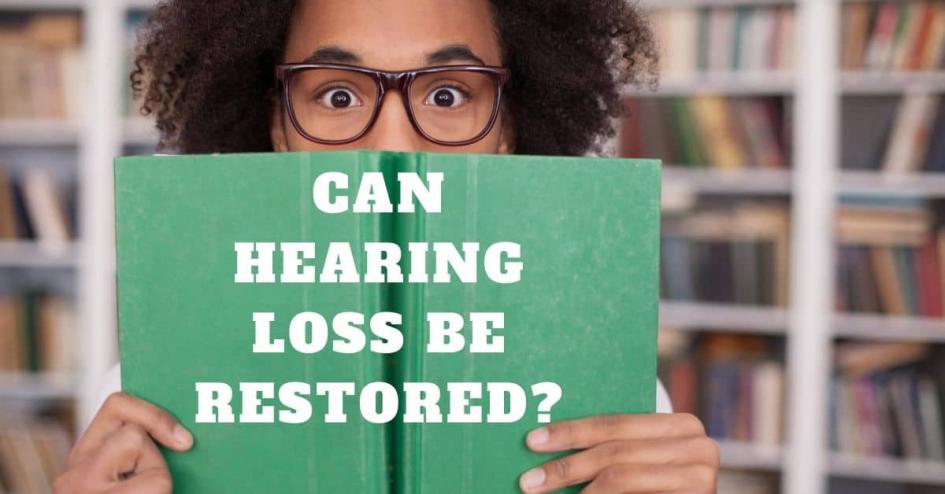
Can Hearing Loss Be Restored?
1 in 6 of the adult population of the United Kingdom is impacted by hearing loss. This affects communication, relationships, health and even the earning power of those who have it. You may wonder if there is any cure out there that can restore your lost hearing if it is impaired. Unfortunately, the answer is probably not, particularly if you have the most common type of hearing loss. In order to answer and fully understand this answer however, we have to learn about how we hear.
How we hear
First, a sound reaches the ear. Then it travels down the ear until the eardrum is hit. The eardrum then vibrates and transfers these vibrations to middle ear bones, which amplifies the vibrations These vibrations are then picked up by hair-like cells throughout the inner ear or cochlea and transformed into electrical signals that the brain can interpret as sound. When sound is unable to reach the brain one way or another, hearing loss occurs.
How our hearing gets damaged
There are two types of hearing loss:
- Conductive hearing loss may happen when the outer and/or middle ear is damaged or blocked. Medical or surgical intervention may be able to restore this type of hearing loss, depending on the nature of the blockage.
- Age or excessive exposure to loud noise can harm the cochlea's hair cells, leading to sensorineural hearing loss. This is a permanent condition and no medical procedure currently exists to fix it. This form of hearing loss accounts for over 90% of all hearing losses out there.
New research could be the beginning of a potential hearing loss cure
The key to restoring hearing in individuals with irreversible deafness may have recently been discovered by scientists at a university in the USA. Using studies on mice, researchers at the Johns Hopkins University School of Medicine claim they have found a couple of proteins that regulate when sound-detecting cells, called hair cells, are born in the mammalian inner ear. “These hair cells are a major player in hearing loss, and knowing more about how they develop will help us figure out ways to replace hair cells that are damaged.” remarked Dr. Angelika Doetzlhofer, associate professor of neuroscience at the Johns Hopkins University School of Medicine
The next best thing: hearing aids
While this news is exciting for those with sensorineural hearing loss, it isn’t unlikely that a widely available surgery to correct hearing loss will be with us anytime soon. But if you’ve been struggling to hear, finding the perfect hearing device can still significantly help your ability to hear, whether in the intimacy of your home or out and about with friends. According to a study of American hearing aid users by the Better Hearing Institute, more than 91% of those who bought hearing aids in the last year were glad that they did so.
The benefits of hearing aids
1. Brain health It's useful for your brain health to treat hearing loss. Hearing aids help you understand speech in challenging listening environments, which enables you to communicate better with others and feel part of the conversation. You wont suffer the embarrassment of continually ask your friends or colleagues to repeat themselves. ⠀A study by the University of Manchester also revealed that hearing aids can reduce the onset of dementia by up to 75%. 2. Physical health Those who suffer hearing loss may make a deliberate decision to refrain from physical activity because they are worried about injuring themselves. But you can become physically active again with better hearing. The ability to step into any environment and be able to hear what you need will give you the confidence to push yourself physically, keeping you healthier in the process. 3. Improved social life It's an obvious point, but meetings with friends are more fun when you are able to understand what they say. You'll never miss an anecdote or punchline, and you'll keep up with the conversation sufficiently enough to add a few yourself. Interactions with those around you will improve significantly because you're going to be happier, more comfortable, and more willing to engage in discussions.
House of Hearing
Research indicates that individuals are waiting for their hearing loss on average 10 years before seeking assistance. And when they are looking for help, GPs fail to refer 45% of individuals with hearing loss to audiology services. Untreated loss can lead to all sorts of mental, physical and emotional conditions, so don’t wait for your GP to refer you. Come and see us for a consultation. We have models to suit all kinds of hearing loss needs, budgets and lifestyles. Contact us today!
Our Clinics
All House of Hearing clinics are in town centre locations and accessible to public transport and parking. Home visits also available if mobility is an issue.


.png)
.png)
.png)

.png)
